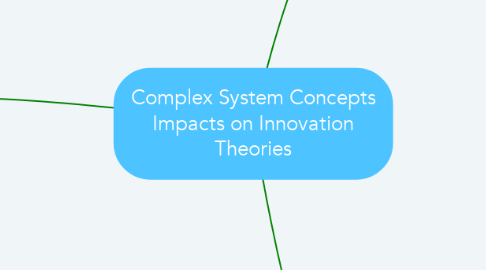
1. Emergence
1.1. Change occurs from a powerful system that is formed and has capabilities beyond what could've been predicted by analyzing the individual parts.
1.1.1. Networks, alliances, coalitions form to create societal change
1.1.2. Communities of practice create self- organized groups based on a common work and see benefits to being in a community where people make commitments to be there for each other to service their own needs as well as those of others.
1.1.3. Systems of Influence organically appear and posses power and influence.
1.2. Example: Social inequalities and racial injustice
1.2.1. Demonstration of social injustices continually displayed, resulting in individuals taking a stand
1.2.2. Individuals came together to protest, forming self organized communities with similar goals, to raise awareness of social injustices happening all around the community
1.2.3. Organizations respond with formation of anti-racism, diversity, inclusion, equity, action committees to educate, listen and respond with intent to make systemic changes
1.3. Evidence: Organized groups coming together to be catalysts of systemic changes.
1.3.1. Black Lives Matter organization raising awareness on systemic racism
1.3.2. Sport teams at all levels removing names, mascots and logos offensive to specific races and ethnic groups
1.3.3. Organized protests in all 50 states and cities around the globe
1.3.4. Companies, colleges, education systems around the country hosting open and honest conversations surrounding social inequalities and racial injustice
2. Causality
2.1. One action results in another action in a dynamic and constantly evolving system (all systems are dynamic and constantly changing in some way; that is the essence of life)
2.1.1. From a complex systems point of view, on one hand there is the system as a whole (collective behaviour) and on another there are individual interactions that lead to the collective behaviour.
2.1.2. "A is the cause and B the effect"
2.1.3. Based on Aristotelian philosophy, the term αἰτία, by which Aristotle meant "explanation" or "answer to a 'why' question"
2.2. Example to healthcare innovation strategy
2.2.1. To help mitigate fall some organizations have installed using a falls sensor pad on the patient's bed.
2.2.2. Alerts are sent a dashboard or mobile device when a patient has triggered the sensor.
2.3. Evidence: Systemic causality leading to a specific outcome or result
2.3.1. Smoking is a systemic cause of lung cancer
2.3.2. HIV is a systemic cause of AIDS
2.3.3. Working in coal mines is a systemic cause of black lung disease
2.3.4. Driving while drunk is a systematic cause of auto accidents
3. Feedback Loops
3.1. Description: In Complex Systems everything is interconnected, there are constant feedback loops and flows between elements of a system. Feedback loops occur when an output of a process within the system is fed back as an input into the same system
3.1.1. Positive (Reinforcing) Feedback Loops - Elements in a system reinforce more of the same leading to an abundance of one element
3.1.2. Negative (Balancing) Feedback Loops - work to negate change and drive stability in systems
3.2. Example to healthcare innovation strategy
3.2.1. Innovation with subsequent Exnovation creating a Negative (Balanced) Feedback Loop
3.2.2. Feedback loops between individual and community health. "neighborhood effects" - how an individual's community and environment can affect that individual’s health in both the short term and the long term
3.2.3. Clinical practices become reinforced within provider networks
3.3. Evidence of Negative Feedback Loops in Healthcare
3.3.1. Best Practices: Covid Admissions receiving Hydroxychloroquine versus Dexamethasone
3.3.2. Policy makers take corrective action when events deviate from the norm or what is desired.
3.4. Evidence of Positive Feedback Loops in Healthcare
3.4.1. Spread of Infectious Diseases - The more infected people there are, the more likely health people will be infected at a faster rate. This will speed up the influx of infected people., which will further increase the count of infected people.
3.4.2. Increasing frustration for patients and increasing pressure on the doctors. - ED doctors are increasingly busy, wait times are increasingly longer, untreated patients are frustrated and worried, they ask doctors for updates, doctors increasingly spend time reassuring untreated patients, causing ED doctors to be increasingly busy.
3.4.3. Poverty and ill health or malnutrition and infection.

